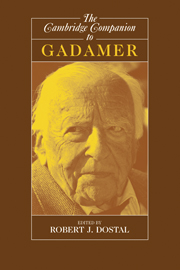Book contents
- Frontmatter
- Introduction
- 1 Gadamer
- 2 Gadamer’s Basic Understanding of Understanding
- 3 Getting it Right
- 4 Hermeneutics, Ethics, and Politics
- 5 The Doing of the Thing Itself
- 6 Gadamer on the Human Sciences
- 7 Lyric as Paradigm
- 8 Gadamer, the Hermeneutic Revolution, and Theology
- 9 Hermeneutics in Practice
- 10 Gadamer’s Hegel
- 11 Gadamer’s Relation to Heidegger and Phenomenology
- 12 The Constellation of Hermeneutics, Critical Theory, and Deconstruction
- Bibliography
- Index
1 - Gadamer
The Man and His Work
Published online by Cambridge University Press: 28 May 2006
- Frontmatter
- Introduction
- 1 Gadamer
- 2 Gadamer’s Basic Understanding of Understanding
- 3 Getting it Right
- 4 Hermeneutics, Ethics, and Politics
- 5 The Doing of the Thing Itself
- 6 Gadamer on the Human Sciences
- 7 Lyric as Paradigm
- 8 Gadamer, the Hermeneutic Revolution, and Theology
- 9 Hermeneutics in Practice
- 10 Gadamer’s Hegel
- 11 Gadamer’s Relation to Heidegger and Phenomenology
- 12 The Constellation of Hermeneutics, Critical Theory, and Deconstruction
- Bibliography
- Index
Summary
In many respects the philosopher Hans-Georg Gadamer has led an unremarkable life. Born into a well-to-do middle class, academic, German family, he enjoyed a Gymnasium (a secondary school preparatory to the university) and a university education that led to a career as a philosophy professor. He retired from the university at age 68 and continues to lecture and write. What distinguishes Gadamer's life is his work. With the publication of Truth and Method in 1960, he helped inaugurate, in philosophy and human studies, an interpretive turn with a worldwide impact. We also note that Gadamer has led a very long life. Born in 1900, his life spans the entire twentieth century. It goes without saying, that Gadamer has led a German life - a German life in a century that might well have been a German century on the world stage but instead was an unmitigated disaster for Germany and for the world. Gadamer's life is closely bound to Germany and its intellectual life, though in his retirement he lectured around the world and spent extensive time teaching and lecturing in North America. A look at his life can illuminate Germany's century as well as the context for his philosophical work. The work, however, is not to be understood merely within this context, for, as Gadamer himself has often argued, a philosophical or literary work always surpasses what the author understands. In addition, this German philosopher found himself with audiences and a readership worldwide.
- Type
- Chapter
- Information
- The Cambridge Companion to Gadamer , pp. 13 - 35Publisher: Cambridge University PressPrint publication year: 2002
- 18
- Cited by



